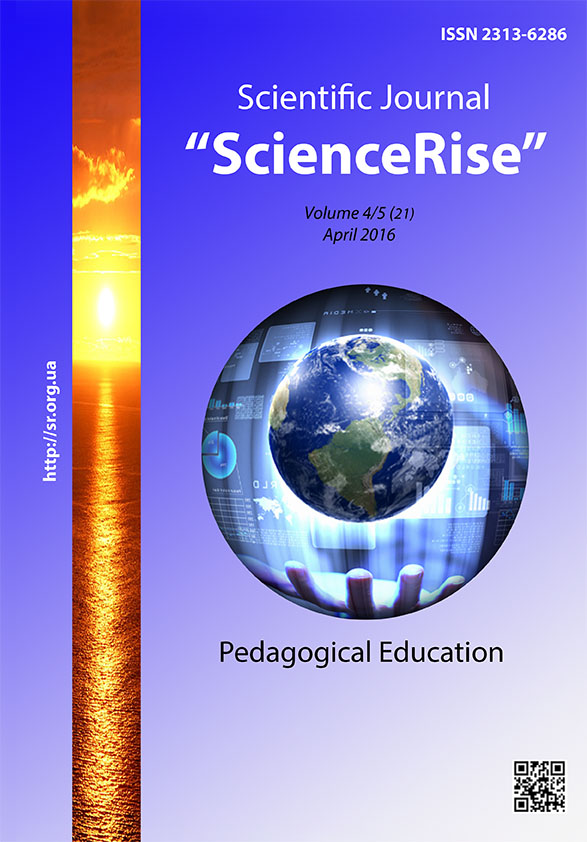Enhanced functions of teacher during the problem-based learning evolution (based on the experience of the European universities participating in the Tempus Medis project)
DOI:
https://doi.org/10.15587/2313-8416.2016.67711Słowa kluczowe:
problem-based learning, advanced problem-based learning, real problem-based learning, iteration, Agile methodologyAbstrakt
In modern conditions the training effectiveness increase relies mainly on the problem-based learning (PBL) methodology implementation. The article reveals the basic forms of PBL evolution and corresponding teaching staff functions. The study exposed detailed features of teacher role at each of the PBL stages methodology development on the example of teaching the industrial control system design. Taking into account these features will allow making the more accurate choice of the desired model for PBL implementation in teaching and learning process and preparing the relevant methodological support. Due to the teacher role complexity increasing with the PBL development the need for further training of instructors in the PBL methodology as well as in the relevant subject area is underlined.Bibliografia
Rhem, J. (1998). Problem-Based Learning: An Introduction. The National Teaching & Learning Forum, 8 (1), 1–4. Available at: http://utminers.utep.edu/robertson/pdf/introduction_pbl_article.pdf
Iskrenko, E. V., Polton, T. A. (2008). Problemno-orientirovannoe obuchenie: osobennosti metodiki prepodavaniya v Velikobritanii (na primere St. George University of London, Great Britain). Zh. Nauchnyie vedomosti Belgorodskogo gosudarstvennogo universiteta. Seriya: Istoriya. Politologiya. Ekonomika. Informatika, 10 (8), 214–218.
Savery, J. R., Duffy, T. M.; Wilson, B. G. (Ed.) (1996). Problem-based learning: An instructional model and its constructivist framework. Constructivist Learning Environments: Case Studies in Instructional Design. New Jersey: Educational Technology Publications, 135–148.
Hassan, H., Martinez, J.-M., Dominguez, C., Perles, A., Albaladejo, J. (2004). Innovative Methodology to Improve the Quality of Electronic Engineering Formation Through Teaching Industrial Computer Engineering. IEEE Transactions on Education, 47 (4), 446–452. doi: 10.1109/te.2004.825541
Hassan, H., Dominguez, C., Martinez, J.-M., Perles, A., Albaladejo, J. (2007). Remote Laboratory Architecture for the Validation of Industrial Control Applications. IEEE Transactions on Industrial Electronics, 54 (6), 3094–3102. doi: 10.1109/tie.2007.907015
Hassan, H., Domínguez, C., Martinez, J. M., Perles, A., Albaladejo, J., Capella, J. V. (2008). Integrated Multicourse Project Based Learning in Electronic Engineering. International Journal of Engineering Education, 24 (3), 581–591.
Hernando, M., Galan, R., Navarro, I., Rodriguez-Losada, D. (2011). Ten Years of Cybertech: The Educational Benefits of Bullfighting Robotics. IEEE Transactions on Education, 54 (4), 569–575. doi: 10.1109/te.2010.2095014
Galchonkov, O. M., Loziienko, N. V. (2015). Advanced problem-based learning. The experience of the European universities participants to the TEMPUS MEDIS project. Odes’kyi Politechnichnyi Universytet. Pratsi, 2, 195–200. doi: 10.15276/opu.2.46.2015.33
Galchonkov, O., Nevrev, O., Loziienko, N. (2016). Real Problem-Based Learning: specific features of the training method for creation of modern industrial control systems (based on the experience of the European universities participating in (TEMPUS MEDIS). ScienceRise, 2/5 (19), 25–29. doi: 10.15587/2313-8416.2016.60621
Agile_software_development (2015). Wikipedia. Available at: https://en.wikipedia.org/wiki/Agile_software_development
544490-TEMPUS-1-2013-1-ES-TEMPUS-JPCR. A Methodology for the Formation of Highly Qualified Engineers at Masters Level in the Design and Development of Advanced Industrial Informatics Systems (2013). Universitat Politecnica de Valencia.
##submission.downloads##
Opublikowane
Numer
Dział
Licencja
Copyright (c) 2016 Oleg Galchonkov, Alexander Nevrev, Natalia Lozienko

Utwór dostępny jest na licencji Creative Commons Uznanie autorstwa 4.0 Międzynarodowe.
Our journal abides by the Creative Commons CC BY copyright rights and permissions for open access journals.
Authors, who are published in this journal, agree to the following conditions:
1. The authors reserve the right to authorship of the work and pass the first publication right of this work to the journal under the terms of a Creative Commons CC BY, which allows others to freely distribute the published research with the obligatory reference to the authors of the original work and the first publication of the work in this journal.
2. The authors have the right to conclude separate supplement agreements that relate to non-exclusive work distribution in the form in which it has been published by the journal (for example, to upload the work to the online storage of the journal or publish it as part of a monograph), provided that the reference to the first publication of the work in this journal is included.

